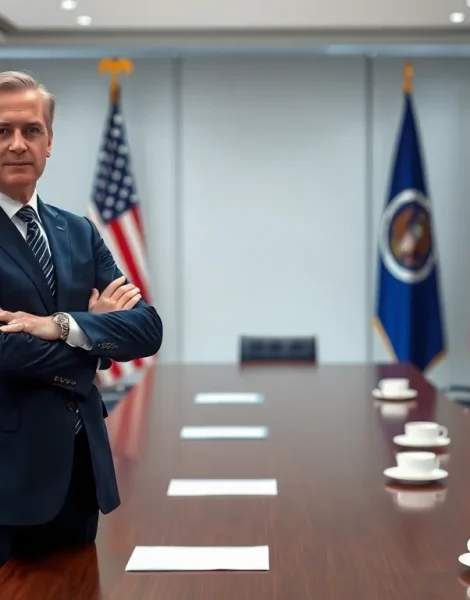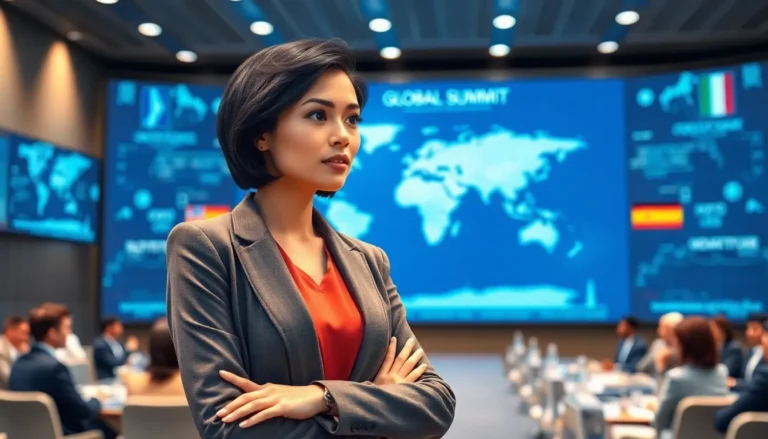Diplomatic relations form the backbone of international interactions, shaping how nations communicate, negotiate, and resolve conflicts. These relationships are essential for maintaining peace, fostering trade, and addressing global challenges like climate change and security threats. Understanding the intricacies of diplomacy reveals how countries navigate their interests while striving for cooperation.
In today’s interconnected world, the dynamics of diplomatic relations are constantly evolving. From formal treaties to informal agreements, the methods of engagement vary widely. As nations grapple with shifting power balances and emerging global issues, the importance of effective diplomacy becomes even more pronounced. This article delves into the key elements of diplomatic relations, highlighting their significance in fostering international stability and collaboration.
Table of Contents
ToggleOverview of Diplomatic Relations
Diplomatic relations refer to the formal interactions between sovereign states. These relationships enable countries to communicate on political, economic, and social issues. Diplomatic missions, including embassies and consulates, serve as platforms for dialogue and negotiations.
Diplomacy encompasses various forms, including bilateral and multilateral engagements. Bilateral diplomacy involves two nations discussing mutual interests, while multilateral diplomacy includes multiple countries addressing shared challenges.
Key functions of diplomatic relations include:
- Representation: Governments appoint diplomats to represent national interests abroad. Diplomats advocate for their country’s policies and foster positive relations with host nations.
- Negotiation: Diplomatic negotiations focus on treaties, trade agreements, and conflict resolution. These discussions aim to enhance cooperation and address disputes.
- Protection: Diplomats protect the rights and welfare of their citizens overseas. They offer assistance in legal matters and ensure safety during crises.
- Communication: Diplomatic channels facilitate communication among governments, aiding in information exchange and understanding.
Changes in global dynamics influence diplomatic relations. Nations adjust their strategies to address new challenges, such as technological advancements and geopolitical shifts. This adaptability ensures that diplomacy remains effective in fostering international collaboration and stability.
Historical Development

The historical development of diplomatic relations traces the evolution of communication among nations through various practices and methodologies.
Early Diplomacy Practices
Early diplomacy practices date back to ancient civilizations, where envoys represented city-states and empires. Egyptians, Greeks, and Romans utilized diplomats for negotiating treaties, establishing alliances, and conducting trade agreements. These envoys often exchanged gifts to symbolize goodwill and forge relationships. The ancient practice of sending ambassadors to rival states highlighted the importance of managing conflicts and maintaining peace.
Evolution in the Modern Era
The modern era saw significant changes in diplomatic relations following the Peace of Westphalia in 1648, which established state sovereignty and laid the groundwork for contemporary diplomacy. The 19th century introduced formal diplomatic protocols and permanent embassies, creating structured frameworks for international relations. Following the two World Wars, organizations like the United Nations emerged, emphasizing multilateral diplomacy. Today, digital communication and social media play crucial roles in shaping how nations engage, adapt, and respond to global challenges.
Key Concepts in Diplomatic Relations
Understanding key concepts in diplomatic relations enhances comprehension of international interactions. These concepts shape how countries engage with one another effectively.
Sovereignty and Recognition
Sovereignty refers to a state’s absolute authority over its territory and the freedom to govern itself. Recognition involves the acknowledgment of a state’s sovereignty by other states. Recognition can be formal or informal, impacting a state’s ability to engage in diplomatic relations. A state not recognized by others faces limitations in forging alliances or participating in negotiations. Recognition plays a crucial role in establishing diplomatic ties, influencing trade agreements and international cooperation.
Diplomatic Immunity and Privileges
Diplomatic immunity protects diplomats from legal actions in the host country, allowing them to perform their duties without interference. This protection extends to the diplomat’s family and staff, creating a safe environment for diplomatic missions. Countries grant diplomatic privileges, including tax exemptions and freedom from local jurisdiction, to facilitate smooth communication and negotiation. Violating diplomatic immunity can result in strained relations and diplomatic protests, underscoring its significance in maintaining international order.
Major Theories of Diplomacy
Various theories of diplomacy provide insights into the principles guiding international relations. Among these, realism, liberalism, and constructivism play significant roles in understanding diplomatic interactions.
Realism in Diplomacy
Realism emphasizes states as the primary actors in international relations. It posits that nations act primarily in their self-interest, prioritizing national security and power above all. Realists argue that the international system is anarchic, meaning no central authority governs state interactions. This theory highlights the competitive nature of states, where military capabilities, strategic alliances, and deterrence strategies become crucial. For example, during the Cold War, realists observed the balance of power between the US and the Soviet Union, showcasing how military strength directly influenced diplomatic negotiations.
Liberalism and Constructivism
Liberalism advocates for cooperation among states, emphasizing institutions, interdependence, and shared values. It suggests that states can achieve mutual benefits through diplomacy, trade, and international organizations. Liberals view international institutions, such as the United Nations and World Trade Organization, as platforms for fostering dialogue and resolving disputes. The establishment of the European Union exemplifies liberalism, where economic interdependence has promoted peace among member states.
Constructivism focuses on the role of social constructs and identities in shaping international relations. It asserts that diplomatic interactions are influenced by historical, cultural, and contextual factors rather than solely material power. Constructivists argue that states’ interests evolve through interactions and shared norms, impacting their diplomatic strategies. For instance, the shift in global attitudes toward climate change illustrates how social movements and public opinion can reshape state behavior in diplomacy.
These theories provide frameworks for evaluating diplomatic practices and understanding how states engage in the complex landscape of international relations.
Contemporary Issues and Challenges
Contemporary diplomatic relations face several pressing issues and challenges. These factors influence how nations interact and respond to both global and regional dynamics.
Globalization and Diplomacy
Globalization significantly affects diplomatic relations. Increased interconnectedness accelerates the exchange of ideas, cultures, and economic activities among states. As trade agreements and international markets expand, countries engage in diplomatic negotiations to address trade barriers and tariffs. For example, the North American Free Trade Agreement (NAFTA) showcased the importance of diplomatic efforts in enhancing economic ties between the United States, Canada, and Mexico. Additionally, the digital economy introduces complexities in governance and regulation. Governments must navigate issues such as cybersecurity and digital privacy, requiring collaborative diplomatic efforts. Climate change also necessitates global cooperation, prompting nations to work together on treaties to combat environmental challenges.
Conflict Resolution and Peacekeeping
Conflict resolution remains a core challenge for contemporary diplomacy. Increasing global tensions often arise from territorial disputes, ethnic conflicts, and resource scarcity. Nations use diplomatic channels to address these issues, emphasizing dialogue and negotiation. For instance, the Camp David Accords illustrate how diplomatic engagement can achieve peace between conflicting parties, leading to lasting agreements. Peacekeeping missions, often organized under the United Nations (UN) auspices, involve diplomatic collaboration among states to stabilize conflict areas. These missions rely on cooperation among nations to provide security and support for rebuilding efforts. Moreover, the effectiveness of peacekeeping forces directly connects to diplomatic relationships between contributing nations and the host country. These ongoing challenges underscore the need for adaptive diplomatic strategies that address evolving conflict dynamics and promote sustainable peace.
Diplomatic relations serve as the backbone of international cooperation and stability. As nations navigate an increasingly complex global landscape they must adapt their strategies to meet emerging challenges. The evolution of diplomacy reflects not only historical contexts but also the necessity for innovative approaches to communication and negotiation.
The interplay of various diplomatic theories and practices highlights the importance of understanding the motivations and interests of different states. By fostering dialogue and collaboration countries can address pressing global issues while promoting peace and security. Ultimately the effectiveness of diplomatic relations will continue to shape the future of international interactions.









